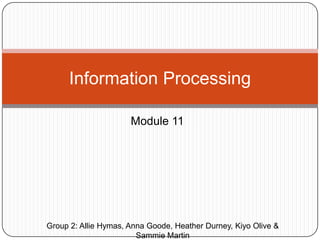
Information processing
- 1. Module 11 Information Processing Group 2: Allie Hymas, Anna Goode, Heather Durney, Kiyo Olive & Sammie Martin
- 2. Information Processing Theory These theories focus on internal mental process that occur as opposed to external behaviors. The mind takes in information, performs operations to change its form, stores it, and retrieves it when needed. The three major categories of these functions are: Sensory Memory Working (or Short Term) Memory Long-Term Memory
- 3. Sensory Memory Sensory Memory takes in information exactly how we sense it, but doesn't leave much time for processing and creating knowledge from it. Humans usually respond to 6 different stimuli with particular attention: 1. Size: large things2. Intensity: Bright and Loud stimuli3. Novelty: new and unusual things4. Incongruity: things that don't make sense within a given context5. Emotion: stimuli with strong emotional attachments6. Personal significance: stimuli personally important to us
- 5. Working memory Once we pay attention to a stimulus, we transfer this information to our working memory, where the information is put to use. Central executive- acts as a supervisor, deems what is important and what strategies to use to process information Working memory holds five to nine chunks of data at time. Working memory can include processes that are outside its conscious awareness, some information is more readily available than others, and our capacity for storing information in working memory varies.
- 7. Working memory Information in working memory is typically lost within 5 to 20 seconds, but it stays longer if we are constantly using it. Automatic and effortful processing Mnemonic devices Chunking: Grouping individual bits of information in meaningful way Girl, cat, pants, apple, pizza, swimming pool, ball, computer, moon, cow, jungle Couch, apple, chair, mom, dad, table, orange, lamp, sister, grapes, brother, rug
- 9. Long term memory Types of Knowledge Explicit: information we are consciously aware of such as facts learned at school Implicit: information we are not aware of such as routines and procedures How to drink out of a big kid cup?
- 10. Long term memory How memories are stored Network Theory: Information is stored in propositions; you can find multiple propositions within a single thought Schema Theory: Information is stored in preexisting frameworks Why do we sometimes have a harder time remembering things that are important than we do remembering things that are not as important?
- 11. Long term memory Forget it? Encoding Failure: the information never made it to the long-term memory Storage Decay: we lose information very quickly at first but the curve levels off Retrieval Failure: we know we learned the information, but can’t remember exactly what it was
- 12. Do you see the three faces?
- 13. Individual Differences in Information Processing Sensory information processing: Younger children process information more slowly than older children Selective attention increases with age, the older the better we are at focusing Girls may have advantage over boys at remembering items on list Working information processing: Young children have less working memory capacity than older children, developmental differences Older individuals process information faster and therefore can retrieve before it decays Young children may be learning information for the first time The more types of knowledge you gain the better you can understand, organize, retain new information
- 14. Differences in strategy use Automaticity: The ability to respond quickly and efficiently while mentally processing or physically performing a task. Examples: flashcards and practice, practice, practice!
- 16. Application to teaching 1. Plan for attention (level) 2. Use attention signals 3. Keep student’s attention engaged 4. Respect attentional limits
- 17. Application to teaching Helping students store and retrieve information effectively: Organization Conceptual Understanding Task analysis Relevance Automaticity Acquisition of Procedural knowledge